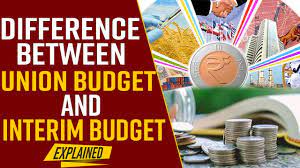The interim budget is an annual financial statement presented by the government of India to meet the expenses for the upcoming financial year until the new government presents its full-fledged budget.

Table of Contents
What is Interim Budget?
It is a budget presented by the government of India before the general elections. It is essentially a budget that covers government spending and revenue collection for the period between April 1st and July 31st of the election year.
During the election year, the government is required to seek approval from the Parliament to spend money. As the full budget for the year cannot be presented due to the uncertainty of the election outcome, an interim budget is presented to keep the government functioning until a new government is formed and a full budget is presented.
The interim budget outlines the estimated revenue and expenses for the upcoming fiscal year, but it typically does not include major policy changes or new initiatives. It is designed to maintain continuity and stability in government operations until a new budget can be presented by the new government.
Why Interim Budget is passed?
An Interim Budget is passed to ensure that the government has the necessary funds to carry out its day-to-day operations and meet its financial obligations during the period between two regular budgets.
In India, the Constitution mandates that the government needs to get the Parliament’s approval to spend money from the Consolidated Fund of India, which is a pool of funds that the government draws from to meet its expenses. As the regular budget is presented in late February or early March, and the new financial year begins on April 1, there could be a gap of a few months where the government needs to continue spending but cannot get parliamentary approval for the same.
To address this issue, the government presents an Interim Budget, which seeks parliamentary approval for a vote on account to withdraw money from the Consolidated Fund of India to meet the government’s expenses during the interim period. The vote on account allows the government to withdraw funds for a maximum period of four months, after which the new government presents a full budget.
In summary, an Interim Budget is passed to ensure that the government has the necessary funds to carry out its day-to-day operations and meet its financial obligations during the period between two regular budgets.
Example of Interim Budget
One recent example of an Interim Budget presented in India is the Interim Budget for the fiscal year 2019-2020, which was presented by the then Finance Minister Piyush Goyal on February 1, 2019. This Interim Budget was presented ahead of the 2019 general elections and covered the period from April 1, 2019, to July 31, 2019.
The Interim Budget for 2019-2020 included some significant announcements such as a full tax rebate for individual taxpayers with an income of up to Rs. 5 lakhs per annum, a scheme for farmers called Pradhan Mantri Kisan Samman Nidhi, which provided direct income support of Rs. 6,000 per year to farmers, and a mega pension scheme for the unorganized sector workers called Pradhan Mantri Shram Yogi Maan-Dhan.
Comparison with Full Fledged Budget
| Parameters | Interim Budget | Full Fledged Budget |
|---|---|---|
| Time of presentation | Presented before the general elections | Presented in late February or early March |
| Duration of budget | Covers the period between April 1 and July 31 of the election year | Covers the entire financial year, from April 1 to March 31 of the following year |
| Nature of the budget | A temporary budget presented to keep the government functioning until a new government is formed and a full budget is presented | A complete and comprehensive budget that outlines the government’s revenue and expenditure for the entire year |
| Scope of the budget | Limited in scope and does not include major policy changes or new initiatives | Comprehensive in scope and includes policy changes, new initiatives, and long-term plans |
| Parliamentary approval | Seeks approval for a vote on account to withdraw money from the Consolidated Fund of India to meet the government’s expenses during the interim period | Seeks parliamentary approval for the government’s expenditure plans and taxation proposals for the entire financial year |
| Significance | A necessary and important measure to ensure continuity in government operations and maintain financial stability during the period of political transition | A crucial policy instrument for the government to achieve its economic and social goals and to allocate resources effectively |
In summary, an Interim Budget is a temporary budget presented before the general elections to keep the government functioning until a new government is formed and a full budget is presented. On the other hand, a Full Fledged Budget is a comprehensive budget that outlines the government’s revenue and expenditure for the entire year and seeks parliamentary approval for the government’s expenditure plans and taxation proposals.
Important Links